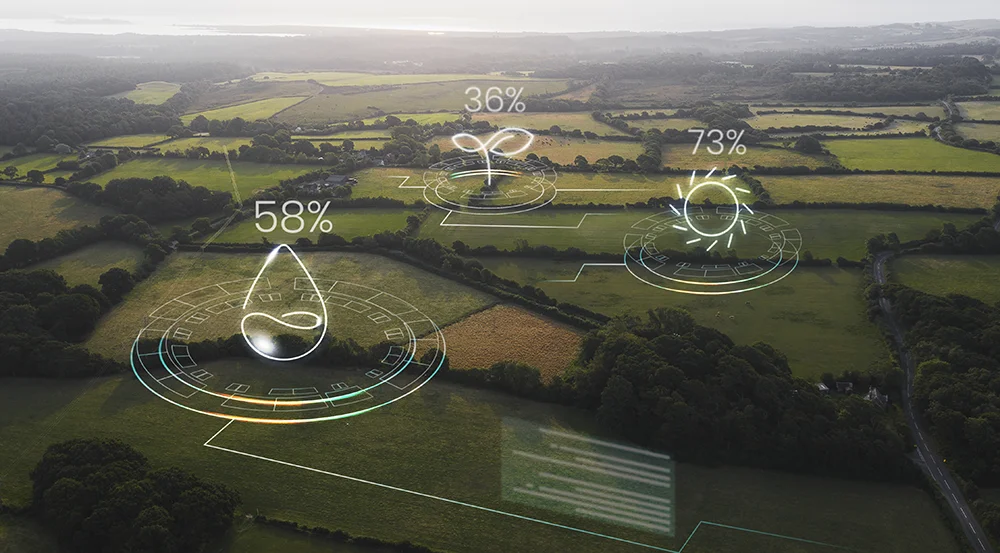Le secteur agricole est en pleine révolution grâce à l’adoption du smart farming, une approche intelligente qui optimise les processus agricoles. Cette forme d’agriculture 4.0 combine les dernières technologies, le big data et l’Internet des objets (IoT) pour améliorer l’efficacité et la durabilité de l’agriculture. Dans cet article, nous explorerons le concept du smart farming, ses avantages pour les agriculteurs, ainsi que son lien avec le big data, l’IoT et l’agriculture intelligente.
Smart Farming: Intelligent Agriculture for Optimum Productivity
Smart farming, also known as smart agriculture, is an advanced system that integrates digital technologies to optimize agricultural operations. This includes the use of big data to analyze and make decisions based on accurate information. Smart devices, such as sensors and drones, play a vital role in collecting real-time data to monitor crops, animals and environmental conditions.
The Challenges of Smart Farming: Revolutionizing Agriculture through Technology
Smart farming meets several of the major challenges facing modern agriculture. It enables more efficient use of resources, and reduces costs and environmental impact. By using precision techniques such as optimized irrigation management and precise fertilizer application, smart farming contributes to more sustainable agricultural production. It also helps farmers forecast weather conditions, diagnose plant and animal diseases, and take appropriate preventive measures.
Smart Farming: Sector-specific applications and benefits
Smart farming offers advantages specific to different agricultural sectors. Breeders can use connected tracking systems to monitor animal health and location, optimizing herd management.
Cereal growers can take advantage of real-time weather data to adjust sowing and harvesting dates, and optimize resource use. Fruit and vegetable growers can monitor crop maturity and prevent disease through sensors and data analysis.
Big Data for Smart Farming: Optimizing Agricultural Yields
Smart farming is based on the use of Big Data to make informed decisions. Data collected by sensors and connected devices is analyzed to provide accurate information on soil conditions, water requirements and weather forecasts. Big data analysis enables farmers to optimize yields, minimize losses and make strategic decisions based on reliable data.
Smart Farming 4.0: The Technological Revolution in Agriculture
Smart farming is part of Agriculture 4.0, the fourth industrial revolution in agriculture. The use of advanced technologies such as big data, IoT and automation is transforming farms into intelligent, interconnected entities. This enables farmers to manage resources efficiently, optimize yields and adapt to environmental changes.

Smart Farming: Solutions for all Farmers
Smart farming solutions are designed for farmers of all sizes. Small farmers can benefit from optimized resources and reduced costs, while larger operations can improve their operational efficiency and productivity. The adoption of smart farming promotes more sustainable agriculture, meeting consumers’ expectations for high-quality, environmentally-friendly food.
Smart devices in Smart Farming: Drones and Sensors for Intelligent Agriculture
Connected objects, such as drones and sensors, play a key role in smart farming. Drones can be used to monitor crops, identify areas requiring special attention and optimize the application of treatments. Sensors collect data on soil, humidity and other parameters, providing valuable information for informed decision-making. The interoperability of connected objects enables optimum management of resources and automation of farming tasks.
[Cas Client] Kineis and smart farming: Intelligent agriculture thanks to satellite communication
Kineis est une société innovante qui révolutionne le secteur agricole grâce à sa technologie de communication par satellite. Dans le contexte du smart farming, Kineis offre aux agriculteurs des solutions avancées pour améliorer la productivité et l’efficacité de leurs exploitations. Grâce à leur réseau de nanosatellites, Kineis permet la collecte et la transmission de données en temps réel, offrant ainsi aux agriculteurs des informations précieuses sur leurs cultures, leur sol et leur bétail. Cette surveillance constante et précise permet de prendre des décisions éclairées en matière d’irrigation, de fertilisation et de gestion des troupeaux, contribuant ainsi à optimiser les rendements, à réduire les coûts et à minimiser l’impact environnemental. Kineis ouvre de nouvelles perspectives pour l’agriculture intelligente, offrant aux agriculteurs les outils nécessaires pour faire face aux défis actuels et futurs du secteur.
Smart farming represents the future of agriculture, combining traditional knowledge with technological advances. With its intelligent approach, smart farming offers significant advantages in terms of efficiency, sustainability and productivity. By integrating big data, IoT and connected objects, it paves the way for agriculture 4.0, offering solutions tailored to all farmers for sustainable and efficient food production.
Need our expertise?
From design to industrialization, production and remanufacturing, we offer ongoing, customized global support to ensure the success of your project.
01
Innovation support
_Building a solid foundation for your industrial project
02
Mechanical and electronic design
_Giving lasting life to your product
03
Industrialization
_Industrializing your product to make your production more reliable
04
Production
_Implementing your robust production line
05
Remanufacturing
_Supporting your product’s life cycle